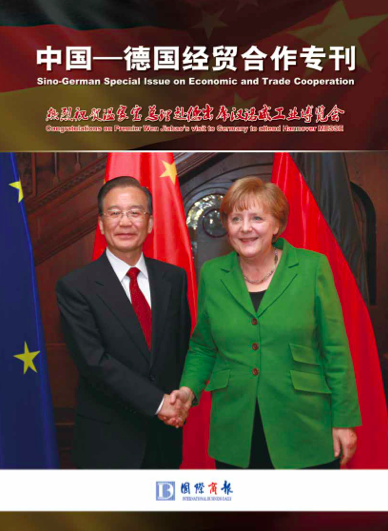2012-04-24: 《国际商报》专访华孙事务所成立者孙一鸣先生
德国华孙专利律师和律师事务所,2012年4月24日,德国慕尼黑
《国际商报》(中华人民共和国商务部主办)在2012年4月24日的《中国—德国经贸合作专刊》中登载了对华孙事务所成立者孙一鸣先生的专访文章。
(点击此处或点击图片下载专刊全文;专访请见第77-80页;感谢《国际商报》社授权提供下载)
Interview with Mr. Yiming Sun, the founder of HUASUN, by "International Business Daily" (managed by Ministry of Commerce of China) for the "Sino-German Special Issue on Economic and Trade Cooperation" in April, 2012 (bilingual: CN and EN)
(Click here or the picture to download the Special Issue; the interview is on pages 77-80; authorized by "International Business Daily")
以下是专访文章内容:
中国企业在德国知识产权领域的挑战和应策——专访德国华孙事务所成立者孙一鸣先生
记者:您好,孙律师。作为第一位中国国籍的德国专利律师,您是如何决定在德国从事知识产权行业、又是什么驱使您在慕尼黑成立了华孙事务所?
孙律师:我从清华大学电气工程专业毕业后来到德国,在慕尼黑理工大学读研究生期间了解到中国的专利制度在很大程度上参照借鉴了德国的制度。同时,我切身体会到德国完善健全的法制环境保证了其整个社会有序高效的和谐运行,使我对德国的法律制度产生了浓厚的兴趣。而严格的德国专利律师培训正好提供了这样一个学习机会:除在专利律师事务所的实践工作外,需要两年的时间来学习民法、商法等方面的法律知识,其后需要在德国专利商标局和联邦专利法院进行实习和培训,并最后通过考试。当然,知识产权在强调科技创新的今天也日益得到重视。这些种种原因使我最后决定从事德国专利律师的工作。
在成立华孙事务所之前,我在德国一家著名的专利律师和律师事务所工作过数年,处理了全球知名的跨国公司众多的专利申请和诉讼案件。不过,该事务所的重点客户主要在美国,繁重的业务量使其无暇积极开拓中国市场。而我作为一个中国人,希望能放开手脚集中去做中国的业务。因此我决定成立一家主要为中国客户、以及与中国有密切联系的国外客户提供德国和欧洲知识产权服务的专业事务所。因为决策层的中国背景,我们可以通过中国和德国同事的密切配合,灵活、迅速地适应我们客户的需求,为其提供贴身、优质的法律服务。
记者:在中国企业提倡科技创新、走向世界的今天,在欧洲特别是科技强国德国,中国企业往往容易陷入竞争对手的专利陷阱。在这方面,您对中国企业有何建议?
孙律师:知识产权是欧美、乃至日本、韩国同业竞争者之间互相抵牾的利器。欧洲的专利诉讼主要集中在德国。德国因为其高效的法院审理程序,正日益成为以苹果、三星为代表的跨国公司知识产权诉讼的一个重要战场。中国企业在德国一旦因为侵权败诉,除了赔偿损害的额度可能远远高于国内水平外,还会面临彻底放弃整个德国乃至欧盟市场的风险。
因此,在新产品进入欧盟市场时,中国企业应该对其知识产权风险有一定的评估,特别是在竞争对手拥有大量专利的情况下。结合专利检索与产品分析,可以找出竞争对手拥有的、具有潜在威胁的专利,这时可以考虑检索现有技术或设计、以无效掉对手的专利,或修改自己产品的技术或外观特征、以规避对手的专利。如果盲目进入欧盟市场而最后深陷对手的专利陷阱的话,可能导致为新产品在欧盟市场的全部努力前功尽弃。
在收到对手的警告函、或对手提起侵权诉讼时,中国企业应该冷静分析对手的指控是否站得住脚。如果确信自己的产品并不侵权或可以无效掉对手的专利,则应该利用法律武器来捍卫自己的权利,并要求对手赔偿给自己造成的损失。如果自己的产品的确侵权、无效掉对手专利的希望不大、并且又不愿放弃相关市场的话,则可以考虑通过谈判、以争取和对手就合理的许可费用达成协议。
当然,中国企业也应该重视通过申请专利等来发展自己的知识产权“武器”。一方面,既可以防止自己的创新成果被抄袭;另一方面,对手在挑起知识产权纠纷前也会心存顾虑、三思后行,自己受保护的知识产权也会成为与对手谈判解决纠纷的重要筹码。
记者:德国有众多享有国际盛名的展览会,比如即将召开的汉诺威工业展览会,中国企业在赴德参加展会时在知识产权方面需要特别注意什么?
孙律师:中国企业在赴德参加展会时,时常受到临时禁令的麻烦。竞争对手往往在展会开始之前就通过调查了解到中国企业可能展出的涉嫌侵权的产品。待展会开始后迅速确认,然后向相关法院递交临时禁令申请。在申请临时禁令之前,竞争对手也时常会先给中国企业发送警告函。由于情况紧急,德国法院往往不经过听证就会迅速签发临时禁令。一旦禁令被送达到展会现场,中国企业就必须立即停止涉嫌侵权产品的展出,否则会面临罚款或短期监禁的风险。中国企业往往还需要为竞争对手承担临时禁令的费用,一般为几千欧元,否则展台的所有展品有可能被查扣。
在参加展会之前,如果中国企业了解到其竞争对手有可能就某项具体的知识产权申请临时禁令的话,可以向相关法院递交自我保护函,陈述准备展出的产品不侵权或对手的知识产权无效的原因。这样,法院在收到对手的临时禁令申请时,就会考虑自我保护函中陈诉的事实和理由,公平考虑双方的诉求。该情况下法院签发临时禁令的可能性也就会大大降低。
在展会期间收到对手警告函时,应该立刻联系德国律师或德国专利律师,分析警告函中所述的侵权理由是否成立或对手相关的知识产权是否有效。我们就曾遇到过竞争对手蓄意利用中国企业不熟悉德国相关法律而进行恫吓的案例。在我们替客户和对手律师交涉后,客户并没有如被警告的那样在其后的展会期间收到临时禁令。
在展会期间如果收到临时禁令,则必须服从禁令的规定。即使认为禁令的签发没有道理,也只能日后通过律师经法律途径解决。
记者:请问贵所在知识产权领域能为中国企业提供哪些具体服务?
孙律师:在申请类方面我们提供德国各类知识产权以及欧洲专利、欧盟外观设计和欧盟商标的申请服务。在非申请类方面我们代理与德国和欧洲各类知识产权相关的异议、无效、侵权程序,并出具各类鉴定报告、包括新产品投入市场的知识产权风险报告。另外,我们也提供展会期间的法律支持,以及知识产权领域的各类法律咨询服务。
作为第一家中国人在德成立的专利律师和律师事务所,我们通过中、德团队成员的精诚合作,可以用中文、英文、德文或法文为客户提供德国和欧洲知识产权领域的各类法律服务。
记者:今年是中德建交40周年,温家宝总理也即将访德,您对未来中德关系的发展有何期待?
孙律师:中德两国已经于去年开启了双方十几位部长共同参加的“中德政府磋商”机制,这也是中国首次同外国政府建立类似机制。
欧盟是中国最大的贸易伙伴。德国作为欧盟首屈一指的大国,在法律制度、科技创新等领域有许多中国可以借鉴学习的地方。而随着中国的迅速崛起,中国也日益成为德国、欧盟作各类重要决定时不可忽视的因素。因此,双方进一步的深入合作符合两国共同的长远利益。
我们期待中德两国今后继续加强各领域、特别是知识产权领域的合作,并衷心祝愿两国共同繁荣、友谊常青!
Reporter: Mr. Sun, as you are the first German Patent Attorney with Chinese nationality, I am very interested to know why you have chosen the protection of intellectual property rights as your career. And what has driven you to found your own patent law firm, HUASUN, in Munich?
Mr. Sun: I came to Germany after graduating from Tsinghua University in China. During my Master study in Technical University of Munich, I learnt that Chinese patent system has adopted many aspects of the German patent system. Meanwhile, my life and study in Germany provided me with the opportunity to experience how the comprehensive legal system in Germany ensures a harmonious society and its efficient functioning, which made me very keen to learn more about German legal system. The strict training program for becoming a German Patent Attorney provides such a good opportunity: it offers two year courses of civil law, commercial law and other important aspects of legal knowledge, as well as the practical work in a patent law firm and the internship in the German Patent and Trademark Office and the Federal Patent Court. Moreover, the protection of intellectual property rights becomes more and more important for the technological innovation in the modern society and my scientific background fits well to this area. So I firmly decided to engage myself in the career of a German Patent Attorney.
Before the founding of HUASUN, I was working in a renowned German law firm of patent attorneys and attorneys-at-law for a couple of years, where I have dealt with a large number of patent prosecutions and litigations for leading international companies. However, this German law firm’s major clients are in the United States, and because of its heavy workload it does not make special effort to explore the Chinese market. As a Chinese, I hope I can have much freedom and decision power to work on issues closely related to China. So I resigned from that law firm and founded my own firm, which mainly targets at Chinese clients and clients with strong connections with China. Because of the Chinese background of our law firm’s decision-makers and the close collaboration between our German and Chinese colleagues, we are able to provide better-customized services for our clients in the fields of German and European intellectual property rights.
Reporter: Today the Chinese companies put more emphases on technological innovations and start to expand their business towards the world. But in Europe and especially in Germany, Chinese companies are often easy to fall into their competitors’ patent traps. Regarding this, what are your suggestions to Chinese companies?
Mr. Sun: Intellectual property rights become key wealth and sharp weapons for Western as well as Japanese and Korean companies in market competitions. Because of its efficient court proceedings, Germany becomes a very important battlefield of the intellectual property rights litigations of multinational companies, such as Apple and Samsung. If losing an infringement case in Germany, Chinese companies usually have to pay a far higher amount of compensation fees than the usual level in China. Moreover, they could face the danger of a complete withdraw from the German and the EU market.
Therefore, before its new products entering the EU market, Chinese companies should assess the risk of intellectual property rights, in particular when their competitors own a large number of patents. Through a combination of patent search and product analysis it is able to identify the potential threat from their competitors’ patents. Then the Chinese company has the option to nullify its competitor’s patents through searching prior art technologies or designs; or to modify its own technical features or designs to avoid the patent infringement. The evaluation of the risk of intellectual property rights is very important, as introducing a new product into the EU market without paying attention to this risk could make all the previous efforts of the company for introducing the new product in vain.
When receiving the competitor’s warning letter, or in the case of an infringement litigation is already in process, Chinese companies should firstly analyze whether the competitor’s allegations are reasoned. If they are confident that their own products are not infringing, or they can nullify the competitor’s patents, then they should use the legal weapons to defend their own interests, and to make the competitor compensate their losses. But, if their product is indeed infringing the competitor’s patent, and there is little hope to nullify the competitor’s patent, they can consider reaching an agreement with their competitor through negotiations, to keep their markets by paying a certain amount of license fee.
Chinese companies should also develop their own intellectual property “weapons” through patent applications. On one hand, they can prevent their inventions or innovations from being illegally copied; on the other hand, their competitors will feel more difficult to provoke an intellectual property dispute. In this case, the protected intellectual property rights of the Chinese company become important bargaining chips in the negotiation with their competitors.
Reporter: Germany has many world-famous international exhibitions, such as the forthcoming Hannover Messe. What is your recommendation to Chinese exhibitors regarding intellectual property rights protection?
Mr. Sun: A common problem Chinese exhibitors often face in Germany is the preliminary injunction. Competitors usually investigate the allegedly infringing products that may be exhibited by Chinese companies before the exhibition actually starts. Once they confirm that those products are truly displayed in the exhibition, they immediately apply for a preliminary injunction to the relevant German court. In some cases, the competitor may send the Chinese company a warning letter before. As these situations are considered to be urgent, the German courts often issue a preliminary injunction without hearing. Once the injunction reaches the booth, Chinese companies must stop exhibiting their allegedly infringing products immediately, otherwise they may have to pay a penalty or be detained. Meanwhile, Chinese companies usually have to pay the costs of the preliminary injunction for their competitor, which usually amount to a few thousand Euros, otherwise all their exhibited products in the booth may be seized.
Before Chinese companies attend an exhibition, if they have learnt that their competitors are very likely to apply for a preliminary injunction with respect to a specific intellectual property right, they could submit a self-protection letter to the relevant court, which states that their products to be exhibited do not infringe the competitor’s intellectual property rights or these rights are not valid. In this case, the court will consider the statements in the Chinese exhibitor’s self-protection letter when receiving an application of preliminary injunction from its competitor. With a fair consideration of the requests from both sides, the count is much less likely to issue a preliminary injunction.
When Chinese companies receive a warning letter from their competitors during the exhibition, they should immediately contact a German Patent Attorney or a German Attorney-at-law. The attorneys will analyze whether the reasons of intellectual property right infringement in the warning letter are justified or not. We have also come across some cases that the competitors deliberately intimidate Chinese companies, taking advantage of their unfamiliarity with German laws. In these cases, we represented our Chinese client and negotiated with the representatives of their competitor. At last, our Chinese client did not receive a preliminary injunction as threated in the warning letter.
When receiving the preliminary injunction during the exhibition, the order of the injunction must be obeyed. Even when considering that the injunction is not justified, it can only be settled down later by entrusting an attorney through legal measurements.
Reporter: Which kinds of concrete services does HUASUN provide for companies in the area of intellectual property rights protection?
Mr. Sun: In the aspect of prosecution we provide services for applying for all kinds of German industrial property rights as well as European Patents, Registered Community Designs and Community Trademarks.
In the area of non-prosecution we represent our clients in opposition, nullity and infringement proceedings regarding all kinds of German and European industrial property rights. Furthermore, we elaborate all kinds of opinions including Freedom-to-operate opinions for launching new products on the market by evaluating the risk in the aspect of industrial property rights. We also provide legal assistance during the exhibition, as well as all kinds of consulting services in the area of intellectual property rights.
As the first law firm of patent attorneys and attorneys-at- law in Germany founded by Chinese, we can use Chinese, English, German or French to support our clients with all kinds of legal services in the area of German and European intellectual property rights, through the close cooperation between our Chinese and German team members.
Reporter: This year is the 40th anniversary of the establishment of diplomatic relations between China and Germany. Premier Wen Jiabao will also start his official visit to Germany soon. What are your anticipations for further development of Sino-German relations?
Mr. Sun: The first “Sino-German intergovernmental consultations” took place last year, which was also the first time of China to build such a special form of cooperation with a foreign government.
The EU is China's largest trading partner. Germany, as the EU's leading country, offers China successful experiences in many aspects, especially in the area of legal system and technical innovations. With its rapid rise, China is increasingly becoming a non-negligible factor for Germany and EU in making their important decisions. Therefore, the promotion of in-depth cooperation between China and Germany is in the long-term interest of both countries.
We look forward to a further strengthening cooperation between Germany and China in wide areas, in particular in the field of intellectual property rights protection. And we sincerely wish that the two countries will deepen their friendship and achieve mutual prosperity.
(Reporter: Sally)

